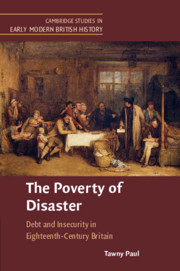Book contents
- The Poverty of Disaster
- Cambridge Studies in Early Modern British History
- The Poverty of Disaster
- Copyright page
- Dedication
- Contents
- Figures
- Tables
- Acknowledgements
- Introduction
- Part I Structures of Insecurity
- Part II The Insecure Self
- Chapter 4 Keeping in Credit
- Chapter 5 Occupational Identities and the Precariousness of Work
- Part III The Debtor’s Body
- Bibliography
- Index
Chapter 4 - Keeping in Credit
Reputation and Gender
from Part II - The Insecure Self
Published online by Cambridge University Press: 27 September 2019
- The Poverty of Disaster
- Cambridge Studies in Early Modern British History
- The Poverty of Disaster
- Copyright page
- Dedication
- Contents
- Figures
- Tables
- Acknowledgements
- Introduction
- Part I Structures of Insecurity
- Part II The Insecure Self
- Chapter 4 Keeping in Credit
- Chapter 5 Occupational Identities and the Precariousness of Work
- Part III The Debtor’s Body
- Bibliography
- Index
Summary
The second section of the book attends to how notions of worth and failure were articulated and mobilised in a precarious economy. Insecurity is the starting point for understanding how individuals accounted for themselves and judged the debts of others. Chapter 4 attends to how debtors framed their own sense of worth. In the eighteenth century, character was increasingly important in economic settings because a person’s financial credibility depended upon his or her social reputation. A good name constituted a kind of currency. This was an economy of circulating selves. Yet the trappings of selfhood were highly unstable. Default was a function of belief and perception. The chapter draws on defamation litigation from Edinburgh, making use of evidence generated by Scotland’s unique legal context to compare the components of credibility for men and women, and to explore the ways in which reputation was constructed and upheld. It highlights the importance of collective and interdependent notions of reputation and status within households. Strategies for mitigating risk and uncertainty involved the cooperation of husbands, wives and household dependents.
- Type
- Chapter
- Information
- The Poverty of DisasterDebt and Insecurity in Eighteenth-Century Britain, pp. 137 - 164Publisher: Cambridge University PressPrint publication year: 2019

